In this article:
High blood pressure is a silent killer!
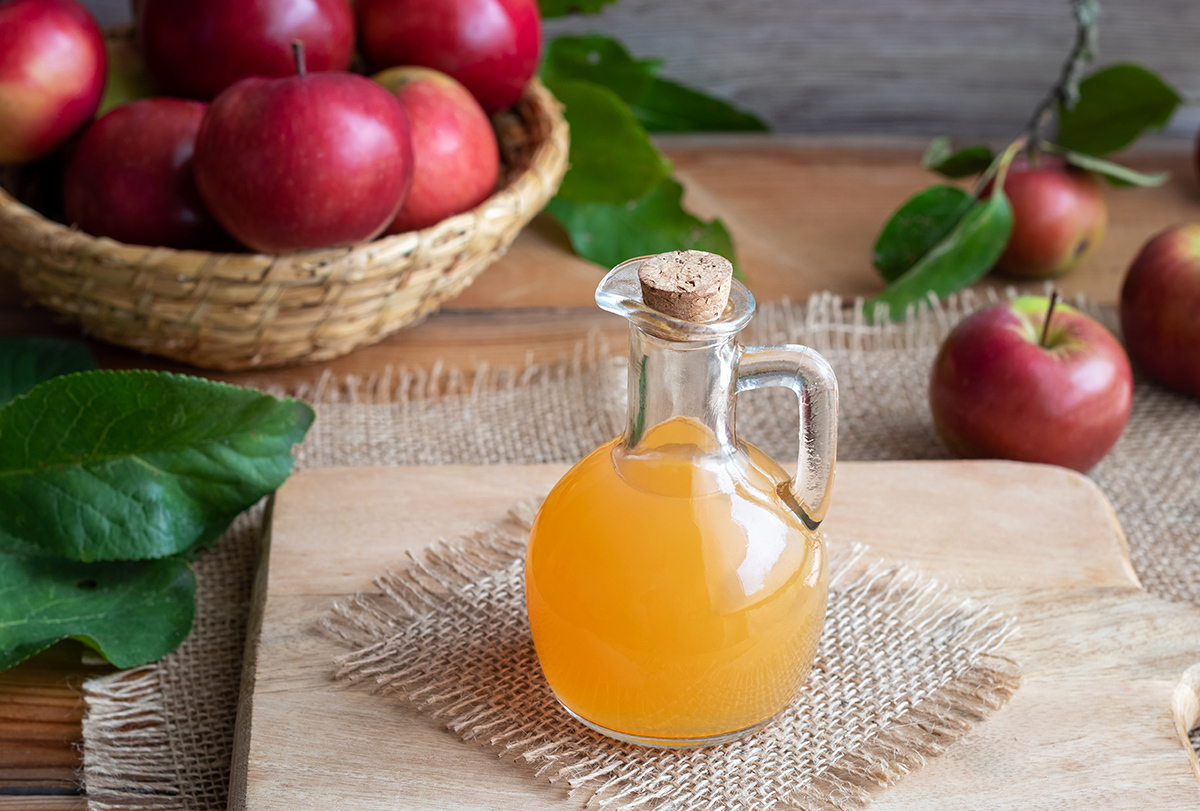
According to the Merck Manual, high blood pressure, medically known as hypertension, is the sustained elevation of resting systolic blood pressure (≥ 140 mm Hg), diastolic blood pressure (≥ 90 mm Hg), or both. (1)
This can lead to several health problems, including heart disease. High blood pressure is perhaps the most common condition related to the circulatory system.
Statistics show that the death rate from hypertension has increased by about 11% in the United States between the years 2005 and 2015, while there was an increase of 38% in the actual number of deaths (up to approximately 79,000) in 2015. (2)
High blood pressure is a common health problem that affects millions of people all over the world. According to the World Health Organization, it causes 7.5 million deaths, or about 12.8% of the total number of deaths. (3)
Hypertension is called a “silent killer” as it can easily go undiagnosed or untreated owing to the lack of significant symptoms associated with this condition. It is a major risk factor for cerebrovascular and coronary heart disease.
Experts recommend getting your blood pressure checked whenever you visit your doctor for a regular checkup. People who are 18 years or older must have their blood pressure checked every two years while those who are aged 40 or above must have it done at least once a year.
Other than medication, people suffering from hypertension are suggested to follow several lifestyle and dietary changes in order to keep their blood pressure level within the normal range.
Incorporating apple cider vinegar in your diet may prove to be effective in dealing with high blood pressure. Apple cider vinegar is a popular natural remedy that is used for the treatment of multiple health issues. It can be effective in the management of high blood pressure.
Apple cider vinegar is made by fermenting crushed apples with yeast and bacteria to convert the fruit sugars into acetic acid. It contains 5%–6% acetic acid, and that’s what makes it effective in reducing blood pressure. It also contains minerals like potassium and magnesium that help to keep your blood pressure under control.
Reasons Why Apple Cider Vinegar Is a Suitable Remedy
Here’s how apple cider vinegar can be helpful in lowering blood pressure.
1. Lowers the activity of renin in the body
Renin is an enzyme that stimulates the release of aldosterone, a very powerful vasoconstrictor that causes significant increases in blood pressure. It also changes the baseline filtering activity of the kidneys.
Aldosterone causes the kidneys to retain both salt and water, which increases the amount of fluid in the body over time. The excess fluid in the body results in elevated blood pressure. Apple cider vinegar helps by reducing the activity of renin in order to bring down blood pressure.
A study published in Kidney Research and Clinical Practice in 2016 reports that higher plasma renin activity (PRA) levels were associated with increased risk for ischemic heart events and congestive heart failure and a trend towards higher mortality among individuals with systolic blood pressure (SBP) ≥ 140 mmHg but not among those with SBP < 140 mmHg. (4)
In a study published in Bioscience, Biotechnology, and Biochemistry, rats with high blood pressure were given vinegar over an extended period of time. It was found that the acetic acid component of the vinegar led to decreases in the enzyme called renin. The drastic reductions in renin activity produced low blood pressure. (5)
2. Helps in lowering blood glucose levels
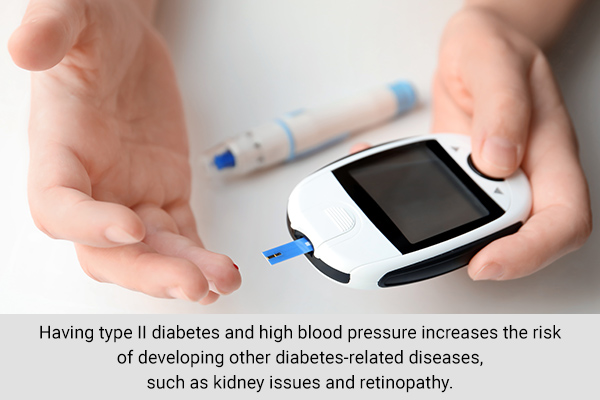
Diabetes is a known risk factor for high blood pressure.
A 2013 survey by the American Diabetes Association (ADA) found that people at risk for heart disease or type II diabetes reported discussing biomarkers, like blood pressure, with their healthcare providers.
A 2016 study published in BMC Endocrine Disorders suggests that hyperglycemia, as well as higher fasting plasma glucose within the normal range, is associated with a higher prevalence of hypertension, independent of other cardiovascular risk factors in elderly Chinese. (6)
Having type II diabetes and high blood pressure also increases the risk of developing other diabetes-related diseases, such as kidney issues and retinopathy. This is why proper management of your blood glucose level is important, and apple cider vinegar can be of great use for this purpose. (7)
According to a rat study published in the British Journal of Nutrition, acetic acid improved the ability of the liver and muscles to take up sugar from the blood. At the same time, acetic acid reduced the ratio of insulin to glucagon, which aids in fat loss. (8)
A 2015 study published in the European Journal of Clinical Nutrition reports that vinegar can be considered beneficial for improving insulin resistance and metabolic abnormalities in the atherogenic prediabetic state. (9)
Another study published the same year in the Journal of Diabetes Research reports that vinegar’s effect on carbohydrate metabolism may be partly due to an increase in glucose uptake, demonstrating an improvement in insulin action in skeletal muscle. (10)
3. Helps in lowering bodyweight
Being overweight or obese is one of the most common risk factors for high blood pressure.
A 2014 study published in the Italian Journal of Pediatrics found that excess body weight, obesity, and abdominal obesity were associated with prehypertension and hypertension in adolescents. (11)
A 2017 study published in the BMJ Open Sport & Exercise Medicine analyzed the prevalence of obesity among student-athletes and found that 50% of those with elevated blood pressure were either obese or overweight. (12)
Apple cider vinegar may prove to be beneficial in keeping body weight under control. It helps boost metabolism, thus enabling the body to burn more fat. Apple cider vinegar helps to control appetite and prevent overeating.
A study published in Biochemical and Biophysical Research Communications reports that acetic acid boosts the level of an enzyme that increases the rate at which fat is burned in the body. Acetic acid reduces the amount of fat and sugar produced by the liver. (13)
A 2014 study published in Nature Communications suggests that acetic acid helps to suppress the centers in the brain that affect appetite, which can lead to reduced food intake. (14)
4. Decreases cholesterol levels
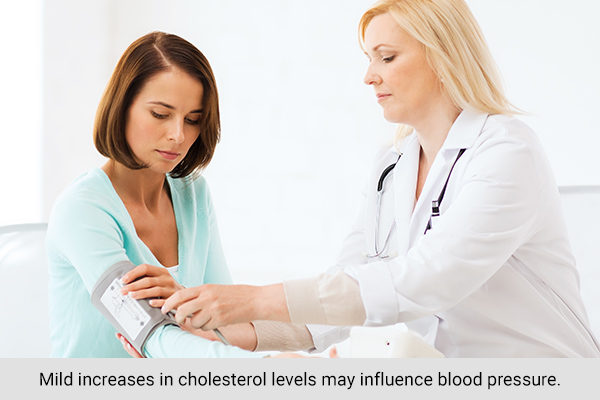
People with elevated blood cholesterol are very likely to have high blood pressure.
A study published in the Journal of Human Hypertension found that those with higher cholesterol levels had significantly higher blood pressure levels during exercise as compared with those with lower cholesterol levels. In fact, mild increases in cholesterol levels may influence blood pressure. (15)
Another study published in the Journal of Hypertension shows that high cholesterol level was directly related to high blood pressure. (16)
By including apple cider vinegar in your diet, you can lower your total cholesterol and triglyceride levels. The acetic acid content in apple cider vinegar is an effective remedy for lowering cholesterol.
A study published in the British Journal of Nutrition reports that dietary acetic acid reduced serum cholesterol and triacylglycerols in rats that were fed a cholesterol-rich diet. (17)
A study published in Life Science Journal found that consuming apple cider vinegar over eight weeks can help lower cholesterol. (18)
5. Contains essential minerals like potassium and magnesium
High blood pressure can be caused by too little potassium or magnesium in the diet. Apple cider vinegar contains both of these minerals, which can help in managing hypertension.
Potassium helps balance the amount of sodium in the cells. This means a low potassium intake will lead to an accumulation of excessive sodium in your blood, thus causing high blood pressure.
A 2015 study published in the Journal of Human Hypertension reports that increased potassium intake along with a low-sodium diet had a beneficial effect on blood pressure. (19)
Magnesium is an important mineral that helps blood vessels relax. A diet low in magnesium may result in high blood pressure. (20)
Consult your doctor for the appropriate monitoring of sodium, potassium, and magnesium. There must be a good balance of these minerals circulating in the body. Excess consumption or too little intake can contribute to irregular heartbeat and cardiac complications.
Using Apple Cider Vinegar to Manage High Blood Pressure
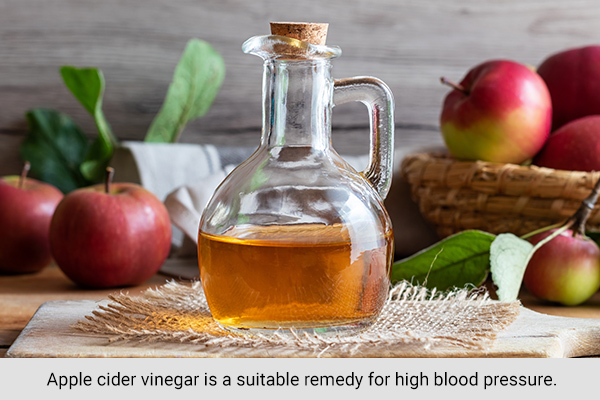
Now that you know the various reasons that make apple cider vinegar a suitable remedy for high blood pressure, let’s take a look at the proper way to make this ingredient part of your diet.
It is recommended that you consume about 2 to 3 tablespoons of apple cider vinegar per day. This can be done by splitting the total recommended intake into two to three doses.
For instance, you can have 1 tablespoon apple cider vinegar twice or three times daily.
- Add 1 tablespoon of raw, unfiltered apple cider vinegar in a glass. (If you are not used to taking apple cider vinegar, then it would be better to start with 1 teaspoon a day and gradually increase the dosage till you reach 2 or 3 tablespoons a day.)
- Dilute it with plain water or fruit juice, depending upon your preference.
- Have it before each main meal. This will help you digest the food and control your appetite.
Other ways to include apple cider vinegar in your diet
- Add it to cooked popcorn.
- Drizzle it over meat or vegetables.
- Add it to a smoothie.
- Mix it with olive oil and herbs to use as a salad dressing.
Note: Make sure you use organic apple cider vinegar for this remedy. Also, excessive consumption of apple cider vinegar may adversely affect your teeth enamel.
Additional Tips to Help You Manage High Blood Pressure
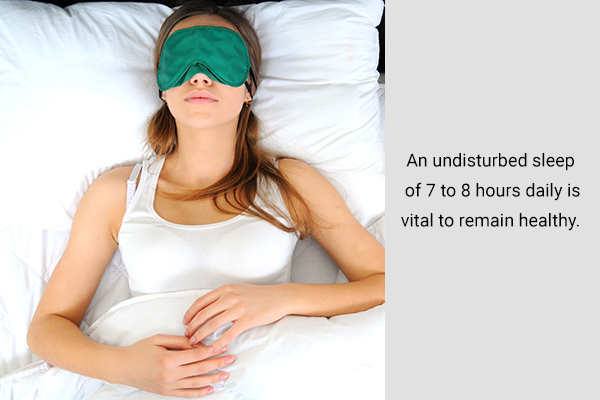
- Monitor your blood pressure regularly.
- Take your medications on time.
- Eat a healthy, low-sodium diet. Include foods that are high in magnesium and potassium in your diet.
- Try to maintain a healthy body weight.
- Limit the intake of refined carbohydrates and sugar.
- Stop smoking.
- Avoid excess consumption of alcohol.
- Manage your stress level. For this, you may practice relaxation techniques like breathing exercises.
- Get enough sleep. An undisturbed sleep of 7 to 8 hours daily is vital to remain healthy.
- Cut back on beverages with caffeine.
- Engage in at least 30 minutes of physical activity each day.
Expert Answers (Q&A)
Answered by Dr. Rachel M. Bond, MD, FACC (Cardiologist)
The ACC/AHA in November 2017 released new blood pressure guidelines that dropped what defines elevated blood pressure, or hypertension by 10 points to anything greater than or equal to 130/80 mmHg.
The main concern with elevated blood pressure or hypertension is that it classically is a silent killer; meaning, it typically does not present with any symptoms.
When symptoms are involved, that’s usually when the blood pressure is an extremely high number or has been ongoing for several years and has led to some degree of organ dysfunction.
Typically, if your blood pressure is above a certain number and you are deemed to have multiple risk factors, medications are usually prescribed. As a cardiologist; however, if I can get away with lifestyle modification, that is usually my first weapon of choice.
This form of treatment involves putting the patient on an exercise regimen, discussing healthy eating and other choices such as stress management, smoking cessation, and alcohol limitations.
Studies show that apple cider vinegar may play a role in keeping your blood pressure low. However, it should be used alongside other treatments and lifestyle changes as well. It’s not a “cure-all,” but it may prove helpful due to its mostly acetic acid content which may lower renin activity, an enzyme that alters blood pressure.
Studies have suggested that apple cider vinegar may also be effective in lowering glucose levels in those with diabetes. However, more research is required, and every patient should discuss with their healthcare professional before initiating this.
There is no “cure-all” drink for the lowering of blood pressure. However, the lethal weapon here is lifestyle modification through diet and exercise.
Final Word
While it is true that apple cider vinegar can help lower high blood pressure, you should not rely on it completely. Continue taking the medicines prescribed by your doctor and strictly follow his or her suggestions and recommendations.
I would like the readers to be aware of the importance of a healthy lifestyle, including limiting sodium to no more than 1500 mg of salt per day which is equivalent to roughly 1.5 teaspoons. Additionally, if you are a female, you should not have more than 1 glass of an alcoholic beverage, and 2 glasses if a male.
You should exercise for at least 150 minutes per week of moderate intensity cardio which can potentially help reduce your chances of having elevated blood pressure and exercise better control over it.
- Was this article helpful?
- YES, THANKS!NOT REALLY



